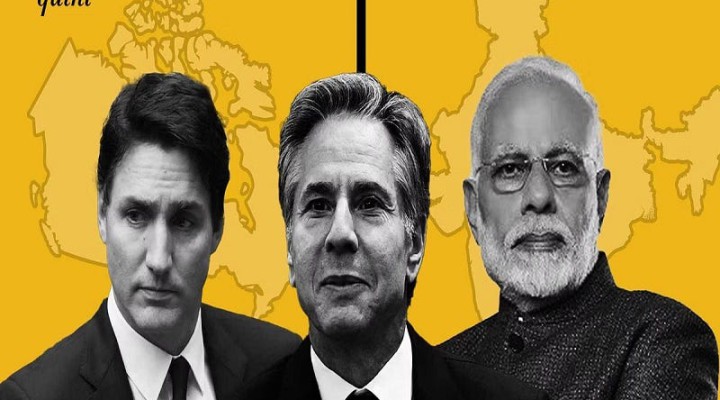Interpreting Blinken’s Remarks On The Indian-Canadian Dispute

Instead of remaining neutral, he let slip that he considers the issue to be one of “alleged transnational repression”, thus resulting in one of the world’s most powerful diplomats lending credence to claims that the deceased was an activist and not a terrorist. Everything is therefore moving towards more open and partisan US involvement in the Indian-Canadian dispute, the implications of which could be major if this trend continues.
It was earlier advised that “Western Leaders Would Do Well To Not Get Dragged Into The Indian-Canadian Dispute”, yet Secretary of State Antony Blinken’s latest remarks on this issue suggest that the US is nevertheless moving in that direction, and tacitly taking Ottawa’s side at that. Here’s how he answered when asked about this issue on the sidelines of the UNGA on Friday according to the State Department’s official transcript:
“Let me say a few things about this. First, we are deeply concerned about the allegations that Prime Minister Trudeau has raised. We have been consulting throughout very closely with our Canadian colleagues – and not just consulting, coordinating with them – on this issue.
And from our perspective, it is critical that the Canadian investigation proceed, and it would be important that India work with the Canadians on this investigation. We want to see accountability, and it’s important that the investigation run its course and lead to that result.
I’m not going to characterize or otherwise speak to diplomatic conversations that we have. We’ve been engaged directly with the Indian Government as well. And again, I think the most productive thing that can happen now is to see this investigation move forward, be completed. And we would hope that our Indian friends would cooperate with that investigation as well.
More broadly – and you’ve heard me speak to this – we are extremely vigilant about any instances of alleged transnational repression, something we take very, very seriously. And I think it’s important more broadly for the international system that any country that might consider engaging in such acts not do so. So it’s something that we’re also focused on in a much broader way.”
The first detail that stands out is Blinken’s admission that the US has been “consulting” and “coordinating” with Canada on this issue, which suggests that it might have been the unnamed “Five Eyes” state that reportedly passed along relevant intelligence about this alleged assassination. Secondly, it’s not the US’ place to make policy recommendations of India in this extremely sensitive context by encouraging it to “work with the Canadians on this investigation”.
The third detail is the conspicuous omission of any implied displeasure at Canada’s decision to go public with this issue. As a diplomat himself, Blinken knows the importance of keeping problems like this discrete if one truly wants to make progress on them, which in turn suggests that he and by extension his government quietly approve of Prime Minister Justin Trudeau making this a global scandal. The fourth detail builds upon the preceding one and concerns the terminology that Blinken employed at the end.
Instead of remaining neutral in this dispute, he let slip that he considers the issue to be one of “alleged transnational repression”, thus resulting in one of the world’s most powerful diplomats lending credence to claims that the deceased was an activist and not a terrorist. This leads to the final point that the US compellingly appears to have tacitly taken Ottawa’s side on this dispute, which Blinken attempted to justify by implying that this stance is driven by the need to deter other alleged assassinations abroad.
Putting these five observations together, the impression that one is left with is that the US’ liberal-globalist policymaking faction took advantage of Trudeau’s decision to publicize this incident in order to regain some of the influence that they lost earlier this summer to their comparatively pragmatic rivals. Instead of trying to preserve these geostrategic gains for the purpose of more effectively containing China, policymakers appear to have been convinced to risk them all for the sake of so-called “values”.
They know better than to outright accuse India of carrying out an assassination on Canadian territory, but they do seem to be strongly suggesting that there’s truth to Trudeau’s accusation as evidenced by what the US’ top diplomat just inadvertently revealed through his latest statement on this issue. The more that the US gets dragged into this dispute, the greater the chance that the Indian public will suspect it of partisanship, which could pressure their policymakers to take a strong stand against the US.
If credible reports emerge that the US set this entire dispute into motion by being the unnamed “Five Eyes” state that passed along relevant intelligence to Canada, or even if a critical mass of Indians begin to suspect it of this, then bilateral ties would be adversely affected. The first scenario is the worst-case one since it would be interpreted as the US sympathizing with anti-Indian terrorists, but the second would also be bad since policymakers might feel forced to temporarily scale back cooperation.
In any case, everything is moving towards more open US involvement in the Indian-Canadian dispute, the implications of which could be major if this trend continues. Any serious worsening of Indo-US ties would shift the delicate balance between the US-led West’s Golden Billion, the Sino–Russo Entente, and the informally Indian-led Global South. It’s premature to predict the exact consequences apart from concluding that those three might have to recalibrate their grand strategies in response if that happens.
https://korybko.substack.com/p/interpreting-blinkens-remarks-on
 TheAltWorld
TheAltWorld 
9 thoughts on “Interpreting Blinken’s Remarks On The Indian-Canadian Dispute”